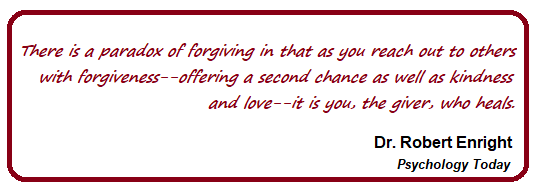Tagged: “break free from the past”
In your answer to my recent question about why so many people use the word “forgiveness” but misunderstand it, I have this follow-up question: Is it true that if I read a journal article with the word “forgiveness” in the title, then that article actually might not be about forgiveness at all, but instead may have distortions about what forgiveness is?
Yes, this is a very insightful point. Just because a journal article passes the peer-review process, this does not mean that the article actually is about forgiveness in its full sense or even in a true sense. Be careful when you read the academic literature on forgiveness because the authors’ understanding of forgiveness may be distorted. Ask yourself: What truly is forgiveness and are these authors being consistent in understanding what it is?
I will never forgive my ex- without his apology. Forgiveness is conditional, right? We should withhold forgiving until the other apologizes. This gives me a sense of respect.
Actually, forgiving unconditionally, without the other first apologizing, is important. Otherwise, you give the other person too much power over your own healing, over your own inner peace. Here is an essay from Psychology Today in which I defend the idea that forgiveness does not require an apology from the one who acted unjustly:
Why Forgiving Does Not Require an Apology
If I forgive a narcissistic person, doesn’t that just give that person a free license to keep abusing me? Doesn’t this make forgiving toxic?
The issue here is not with forgiving itself but with a failure to see that as you forgive you can and should seek justice from the one who is hurting you. Forgive and ask something of the other person.
If others keep pressuring a person to forgive, doesn’t that make forgiving a bad thing?
The problem here is not with forgiving but instead with people not being gentle with those who are hurting. Putting pressure on others is not the fault of forgiveness itself.
The Backlash Against Forgiveness Continues
In a recent blog at Psychology Today, I examined “14 Popular Criticisms of Forgiveness.”
The gist of that essay is this: Many people generate their own opinions about why forgiveness is inappropriate, dangerous, disrespectful, and/or confusing, but their defense of these assertions is always, and without exception, philosophically flawed, rendering the opinion unfounded.
Well, I came across yet another set of criticisms against forgiveness and I would like to address them here. As I often do, I will not identify the author(s) because the point is to examine ideas, not persons. So then, let us begin.
1. Encouraging forgiveness might short-circuit the anger process. In other words, people tend to need a time of anger, which shows self-respect. So, don’t encourage. This, of course, is not a critique of forgiving itself. Instead, it is a criticism of those who might put pressure on others who need a time of self-reflection to work out the anger first. Our Process Model of forgiveness, since its creation over three decades ago, always has called for a period of anger and self-reflection as needed by the forgiver. Thus, forgiveness itself and even the encouragement of others to forgive are not the problems. In the case of encouragement, this depends on how the well-meaning person goes about trying to encourage another person to forgive. Is it with gentleness and understanding or is it with at least a pinch of force (which should not happen)?
goes about trying to encourage another person to forgive. Is it with gentleness and understanding or is it with at least a pinch of force (which should not happen)?
2. If you encourage people to forgive, then this might short-circuit the quest for justice. As with point 1 above, this criticism is not about forgiveness at all, but about the philosophical mistake of thinking in an “either-or” way about justice and forgiveness. It is not the case that one must choose between these two moral virtues. The criticism against forgiveness itself fails to take this into account.
3. An abuser who asks for forgiveness might be manipulating the victim into the status quo of more abuse against this victim. Again, the issue is not with forgiveness itself, but instead is a problem centered in the poor intentions of the one who asks. The one who might forgive certainly should scrutinize the motives of the one asking for forgiveness. This is plain common sense. In other words, again we have the situation in which forgiveness might be taking the blame for those who fail to ascertain motives in those who behave badly.
4. Suggesting forgiveness by groups that have been oppressed is abusive because this might perpetuate the abuse. Once again, we have a philosophical error in assuming that groups must choose between forgiving and seeking justice: Forgive and then say goodbye to the hope of a fair solution. This is reductionistic thinking. Let us help people to see that as groups consider forgiving, they should scrutinize the best way forward for a just solution to seemingly intractable social problems.
The backlash against forgiveness, I hope you see, is not about the moral virtue of forgiveness at all. Instead, it is about how people erroneously go about suggesting forgiveness or how people go about practicing forgiving. If the advice were centered on persons and how they go about the advice or how they go about the practice of forgiving, then all is well. When the criticism turns instead to forgiveness, it is time, as I have tried to do in this essay, to show the philosophical flaws in the reasoning of those who oppose the moral virtue of forgiveness.
![]()



